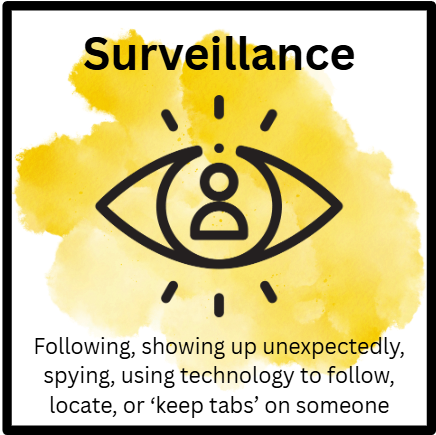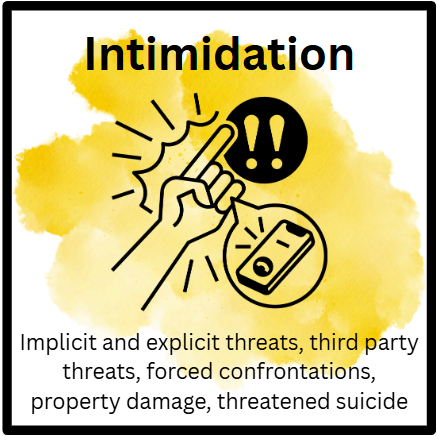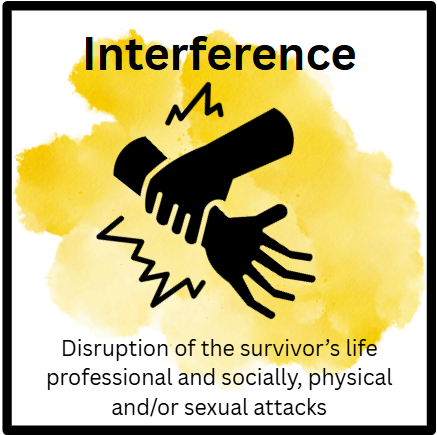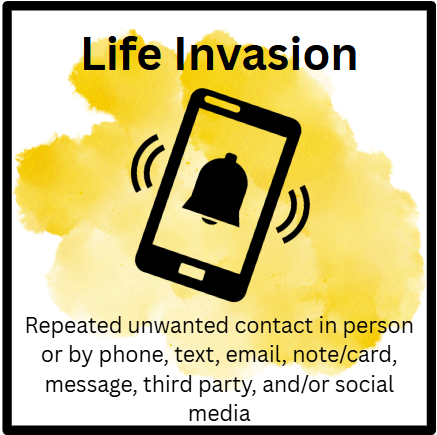Stalking
Stalking is a pattern of repeated, unwanted attention and contact by a person that causes fear or concern for one’s own safety or the safety of others. Stalking can take place in person or through online or digital means. The legal definition of stalking requires two or more acts, including, but not limited to, acts in which the stalker directly, indirectly, or through third parties, by any action, method, device, or means, follows, monitors, observes, surveils, threatens, or communicates to or about a person, or interferes with a person’s property, leading to “substantial emotional distress” by the person experiencing stalking. “Substantial emotional distress” means significant mental suffering or anguish that may, but does not necessarily require, medical or other professional treatment or counseling.
The Wake Forest University’s Sexual Misconduct Policy and Grievance Procedures more specifically defines stalking as “defined in 34 U.S.C. § 12291(a)(30): engaging in a course of conduct directed at a specific person that would cause a reasonable person to (A) fear for their safety or the safety of others; or (B) suffer substantial emotional distress. A “course of conduct” means two or more acts, including, but not limited to, acts in which the stalker directly, indirectly, or through third parties, by any action, method, device, or means, follows, monitors, observes, surveils, threatens, or communicates to or about a person, or interferes with a person’s property. “Substantial emotional distress” means significant mental suffering or anguish that may, but does not necessarily require, medical or other professional treatment or counseling.”
Learn more about stalking at SPARC (Stalking Awareness, Prevention, and Resource Center).
Stalking Behaviors




Take these S.T.E.P.S if you think someone could be stalking you:
Acknowledge the concern as stalking. Trust your instincts. Friends or family often pressure people who are concerned someone is stalking them to downplay the stalker’s behavior, but stalking poses a real threat of harm. Your safety is paramount.
Determine the unique threats the stalker poses, and your unique vulnerabilities. Create a safety plan. If you have more concerns about threats, contact the Safe Office 24/7 at 336.758.5285 for consultation. If you feel you are in imminent danger, call 911 or Wake Forest campus police at 336.758.5911. Explain why actions that may seem harmless are causing you fear.
- Preserve evidence and make documentation of stalking behaviors
- Keep a record or log of each contact with the stalker and include specific information on date, time, place, event, and any witnesses
- Document any police reports
- Save any physical evidence (e.g. notes, gifts, objects, photos, and voice messages) and take screenshots of digital evidence
- Alter typical routes you take to/from home, school, work, errands, and/or while exercising
- Walk with friends on your altered routes
- Get savvy about location tracking and other technology abuse stalkers may use, especially if you have previously shared location tracking abilities with the stalker. Tracking tags are smaller and easier to attain than ever. Learn more at Safety Net Project.
- Use the Wake Safe App features, including:
- Digital friend walk: send your location in real-time to a friend to see you walk to your destination. Your friend can trigger a call to emergency services if needed
- WFU police safety escorts
- Mobile Blue Light: this function will send your device’ location services capabilities to the WFU Police Department and initiate a call to dispatch
- The ability to call 911, WFU police, or initiate a chat with WFU police
- Start with Safe – call us 24/7 at 336.758.5285, email us at safe@wfu.edu, or walk-in to our office during business hours for a crisis appointment Monday – Friday, 8:30a-5p.
- You may elect to share what has happened with a safe family member or friend first, or you may find it easier to talk to a trained advocate or licensed mental health professional who specializes in interpersonal violence. Remember Wake Forest has a variety of confidential resources you can access for help and support. If you prefer to start with a hotline, helpline, community, or national resource, those are available too.
What’s the difference between a no contact order and a restraining order?
No contact orders are typically mutual, two-way agreements to block communication between two parties who are both enrolled at the University. No contact orders block direct communication (such as through verbal, written, email, or text message means), indirect communication (such as through social media, online postings and/or personal references), and attempting to reach the other party through a third party to transmit communication back to the other person. A no contact order does not restrict a party’s physical movement or proximity to the other party, and will not prohibit the two individuals from being in the same location on campus at the same time. Title IX can provide students experiencing interpersonal violence and/or stalking with a no contact order, which is considered a supportive measure.
A restraining order is a civil order issued by a judge and can be criminally enforced if violated- also known as a 50/b or 50/c.
- 50/b- used in cases of domestic violence/dating relationships (or other “personal relationship” stipulations defined by NC law)
- 50/c- used in cases of violence where parties did not have a “personal relationship” defined by NC law (i.e. stranger sexual assault or stalking, casual acquaintance)
A restraining order is able to restrict both communication and physical proximity, and the court can criminally enforce it if someone violates it. The court would typically use a restraining order when one party is not associated with the University.
Do you feel like you might need a no contact order, a 50/b, or a 50/c? Call us 24/7 at 336.758.5285. An advocate can discuss the process with you and accompany you throughout the process.

Need to leave the website quickly?
Safe Office
Need immediate assistance?
24/7 Confidential Support Line
Have a non-urgent question?
Visit Us!
Wake Safe App

- Mobile BlueLight: send your location to and call WFU PD simultaneously.
- Friend Walk: sends your location in real-time to a friend so they can watch you as you walk to your destination!
- Social Escape: allows you to get out of a tough social situation by calling you and giving you an excuse to leave.
- We Are Wake: a comprehensive call to care for the mental health of all students.
- Campus Support Resources
